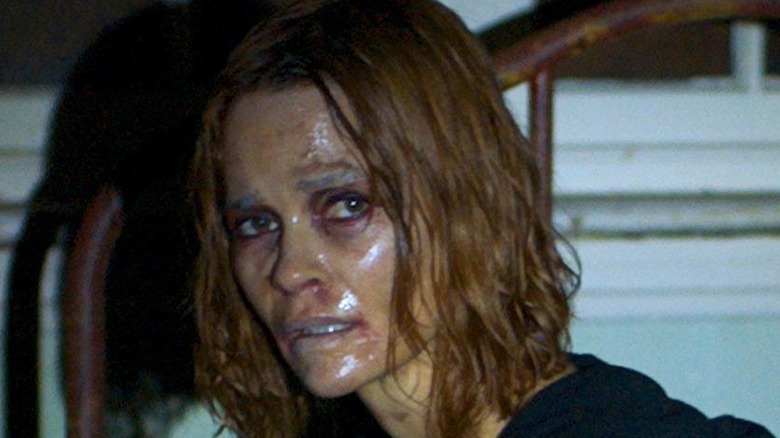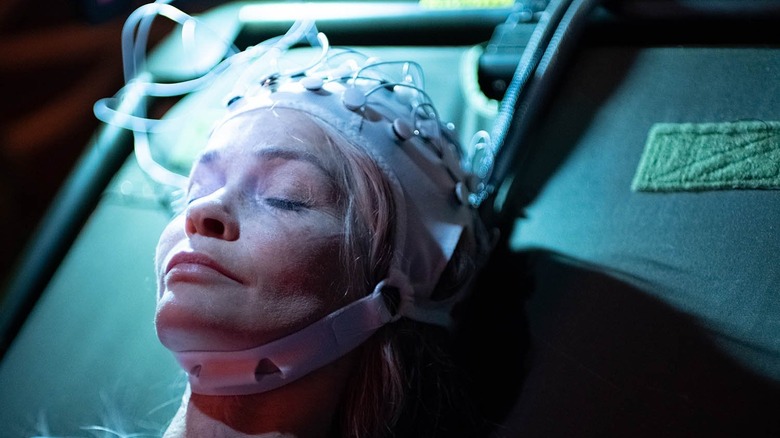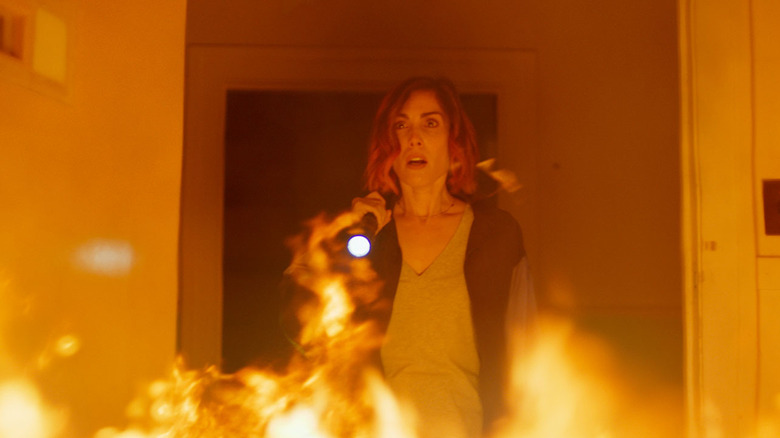Demonic Review: District 666
Ten years ago, Neill Blomkamp was being heralded as one of the most important new voices in cinema, the potential new face of original blockbuster storytelling in an industry dominated by franchises. This was all off the back of "District 9," his science fiction allegory for Apartheid-era South Africa, which became both a global box office hit and surprise Best Picture nominee. From there, his trajectory to becoming a force in cinema equal to Christopher Nolan (now the default shorthand for a filmmaker routinely awarded large budgets for original projects) seemed secure.
His followup film, "Elysium," attracted A-list talent and a $115 million budget, but things didn't go as planned. It underwhelmed upon release, with critics responding to the idea of a new voice bringing socially conscious topics into large-scale filmmaking, but not the film itself. So he decided to go back to the comfort zone of his debut — and only left people colder by returning with "Chappie," a film in which the rap duo Die Antwoord (starring as their stage personas) steal a robot from the South African police.
It's a film which now exists first and foremost as a punchline, effectively placing him in the fabled "director jail" of filmmakers who are unofficially blacklisted by Hollywood. The fact it turned a modest profit didn't matter; If you take $49 million worth of studio money and return with "Chappie," they're not going to be happy about it. If anything, part of the reason why I enjoy that film so much is precisely because I imagine a horrified studio executive sitting through it.
Back to Basics
Now, Blomkamp is no longer approached for original ideas, only ever attached to reboots of various science fiction properties that never go into production. With six films separating us from his last studio effort, he's decided to scale down even further, with a pandemic-shot hybrid of horror and sci-fi that aims to reinstate his reputation as one of the most idea-driven filmmakers in the mainstream. The finished product is "Demonic," an interesting in theory attempt to blend two opposing subgenres: the tech-driven cyberthriller, and horror driven by religious folklore and tales of demonic possessions. But as has become a recurring issue for the director, the strength of his ideas doesn't translate into the material — and the resulting film quickly turns into a near-endless slog of exposition dumps and flat performances. If this is what he's become as a storyteller, then it'll take more than a "District 9" sequel to help him recapture that early promise.
Carly (Carly Pope) has a long-fractured relationship with her mother Angela (Nathalie Boltt), which is pretty understandable considering that her mother has been in jail for years following a murderous rampage. She hasn't been to visit once, and has put her family life behind her, until one day she's approached by estranged childhood friend Martin (Chris William Martin), who is taking part in a scientific study where convicted felons are being used as test subjects. Angela is in a coma, with a research group developing an apparatus to visualize her subconscious, allowing people to go in and speak directly with her.
The researchers have discovered that Angela has been asking for Carly, and as she's started having vivid nightmares about her mother, she reluctantly obliges to visit the lab. When Carly arrives in the subconscious, she realizes that it wasn't her mother who committed the crimes 20 years earlier, but a demonic entity that took hold of her. The visions Carly experiences become more frequent, and she has no choice but to go back to Martin for help, as suddenly, his conspiracy theories about the Vatican being in control of research facilities to lure in demons don't sound so far-fetched.
While watching "Demonic," I thought back to my experience watching M. Night Shyamalan's recent film "Old," a film which has been mostly criticized by its detractors for its stilted dialogue and overly mannered line readings. This is a complaint often leveraged at Shyamalan's films, even though it feels like a deliberate stylistic choice — he's not shy about acknowledging his various B-movie influences, after all. Blomkamp, on the other hand, isn't as considered in his screenwriting approach. In previous interviews, he's discussed how much he hates writing screenplays, enjoying writing treatments for stories and designing concept art, but not creating the glue that can hold all those ideas together. This has never been more apparent than in his latest film, in which his characters indulge in endless exposition, with a clear uncertainty from a directorial perspective as to how he could make it compelling.
A low-budget experiment
It doesn't help that his film was very obviously shot during the pandemic, with certain sequences (such as an early, overlong conversation between Carly and Martin at a public park) feeling awkward due to the very placement of the actors. But even in the scenes where that isn't an issue, Blomkamp seems to be directing his ensemble to deliver their lines with an overbearing self-seriousness. It takes a truly special talent to write a monologue about a special Vatican Black Ops team performing covert exorcisms, and to remove anything about it that could be considered good silly fun. Blomkamp has worked with non-professional actors before to great success — but here, he's refused to stray from a script he doesn't seem to have faith in, and as a result, makes little effort to help his cast actually engage with the material they've been given.
So if Blomkamp approaches each project strictly from a design perspective rather than a storytelling one, what innovations does he actually have to offer in "Demonic"? Well, there's just one: he's pioneered a new form of volumetric capture technology for the sequences set in the comatose mind space. Like motion capture technology but on a limited budget, the program enables the director to place these actors in a heightened, otherworldly space, ideal for a narrative about journeying to the center of the human consciousness. The problem is that these sequences are visually unappealing, with all the cinematic dynamism of PlayStation 2-era video game graphics. Instead of creating something haunting in its uncanniness, he's visualized an intriguing concept in an unremarkable way, which will only serve to put the audience into the same state of consciousness as its main antagonist.
Beyond everything else, the biggest problem with "Demonic" is that it is almost improbably boring. No film with such a genre-defying high concept, complete with intriguing tech innovations behind the camera, should fail to hold onto the audience's attention this badly. And yet, with the exception of a couple of very brief moments when Blomkamp leans into horror and his film actually gains a pulse, this film is an absolute chore to watch. A film with all of the ideas of an exciting midnight movie, made with all the passion of a man who'd rather be delivering a seminar about his new filmmaking software instead.


